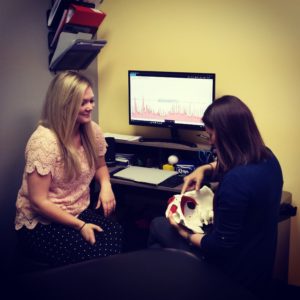If you’ve read Katie’s blog post on What is the Core and Why You Should Care, then you may know that the pelvic floor is considered part of our “core muscles” in the physio world. If not, our core is made up of 4 muscle groups, the transversus abdominus (TA), the multifidus, the diaphragm and the pelvic floor. Being in PT school and learning this for the first time was surely a shock for me! It seemed a little funny at times when you’re trying to teach your classmates in lab how to contract the pelvic floor, but little did I know it is not only very hard, but it is very important!
If you asked me before I started PT school if I would be interested in pelvic floor physiotherapy, I probably would have looked at you funny because I didn’t even know it existed. I always thought I would get into the sports world and work in strictly orthopedics. It wasn’t until I realized that many women and men can’t compete, let alone participate in physical activity, because of urinary incontinence and pelvic floor dysfunction. I mean in physio we’re taught to always encourage and support physical activity and help with any barriers that may be present. We typically think of those “barriers” being lack of time, money, pain, other injuries or co-morbidities like heart disease, but you don’t typically hear people saying, “I don’t exercise because I leak”, or “pain in my pelvic region stops me from exercising”. It’s a hush hush problem. What if someone could change that?
So naturally being the curious person I am, I decided to Google “urinary incontinence + treatment + physiotherapy”. Well that was the day I realized there was a WHOLE specialization for these issues. Not to mention treatment for all the other big words and diagnoses that I didn’t know existed but am slowly learning thanks to Katie!
Luckily, Katie posted a senior clinical placement for Dalhousie Physiotherapy students and I jumped on the opportunity as fast as I could. These placements are rare, so I am sure lucky to be able to experience this type of work. Consequently, here I am in Moncton for six weeks having the pleasure to learn from Katie and all her patients.
So, here’s what I’ve learned (okay I’ll only mention a few things, because I have learned A LOT):
- Urinary incontinence is a very common issue! It is also a very treatable issue! Your daily activities shouldn’t have to be limited by urinary incontinence and there are SO many strategies to treat this!
- This one is for my physio friends: just because you work on the “Pelvic floor”, doesn’t mean your orthopedic, cardiorespiratory and neurology skills don’t come into play. They all fall hand in hand! It’s really is eye opening to see how much knowledge overflows from every specialization in physio. We really do consider the whole person, and yes, your sprained ankle from 2 years ago does matter when we are treating your pelvic floor!
- NOT EVERYONE SHOULD KEGEL! Many of us have heard the word, maybe tried it, but not all of us should perform it. Not to mention many of us do it WRONG! Who knew some of us can’t relax the pelvic floor? I never knew how much of an issue this was! Sometimes we think we’re doing the best thing possible, but we can also be making certain issues worse.
- Breathing. We all do this, but a lot of us do it wrong. Alright crazy physio student, what do you mean? I mean that many of us don’t know how to use our breath to relax, and contract our pelvic floor. They need to work in sync. If they don’t work together we put pressure on our pelvic floor in ways that we shouldn’t! Then you add CrossFit, running, or lifting your grandchildren on top of that and pressure increases even more! Not great. Breathing is harder than it looks, but don’t worry, we can help those breathing muscles work well so eventually it becomes automatic again!
Now, for something I have confirmed during this placement. Urinary incontinence, and other pelvic floor issues should NOT run your life. Sometimes we ignore them because we don’t talk about it. No one has a problem saying, “I rolled my ankle and I’m in pain but my physio gave me exercises to strengthen it!”, but many of us have problems saying, “I leak because my muscles are weak” or “I have severe pelvic pain that stops me from walking my dog”. I’m not saying you need to announce your issues to the world, but I am saying that there are ways you can be treated. Reach out if you need help. Our goal as physiotherapists is to keep you moving, doing the things you love, and if pelvic issues are stopping you, it is not ‘normal’.
I know I have a million more things to learn, courses to take, and people to meet before I can start  treating the pelvic floor, but I have been incredibly lucky to have experienced this placement so far. Katie has a wealth of knowledge that I hope to have one day and can’t thank her enough for how she’s helped me learn and grow as a future therapist.
treating the pelvic floor, but I have been incredibly lucky to have experienced this placement so far. Katie has a wealth of knowledge that I hope to have one day and can’t thank her enough for how she’s helped me learn and grow as a future therapist.
Finally, I would like to thank all the patients who have been so kind as to let me be with them throughout their journey. I know it isn’t the easiest appointment to have me join, but it is more appreciated than you can ever know. YOU are the reason I am learning, THANK YOU!
Maria Radelich
PT Student, Dalhousie University 2017







